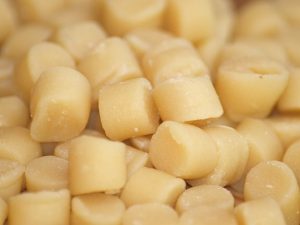As part of our series of “What can dogs eat?” hub we’ve now been tasked with answering the question of “can dogs eat cheese?”. We’re going to take a look at answer the question directly and then explore why should you feet a dog cheese, any side effects of doing so, are there any benefits and drawbacks to feeding them cheesy stuff and any other useful information regarding canines and fermented milk.
It can be very confusing knowing what you can feed a dog as their digestive system can handle some things brilliantly that humans struggle with but at the same time can be become very sick (or worse in some cases) if they ingest something that a human would be perfectly fine with. Cheese is a staple food of most people’s diets around the world, let’s find out what a dog would think if they ate some of it.
 Can dogs eat cheese?
Can dogs eat cheese?
Yes! To put it simply, most dogs would have absolutely no problem eating cheese in small quantities and not as a replacement for proper food such as wet dog food and dry purpose made dog food. Cheese is not toxic or harmful to dogs so you should encounter no unwanted affects if your dog has managed to steal some cheese or even if you’ve fed the dog cheese as a replacement dog treat.
This is the most simplistic catch-all answer we can give to the question – however if you prefer to learn more about your dog and their diet then please read on as we explore the benefits, drawbacks and ultimate answer the question of should you feed your dog cheese rather than can they eat cheese.
Should dogs eat cheese?
Perhaps the most important question isn’t can dogs eat cheese but should they eat cheese in the first place. There’s a big debate over the consumption of dairy in human beings every day around the world as it’s not a natural animal product that humans would have ate before the advancement of farming and technology. To put it simply, it would be impossible for dogs to make cheese on their own therefore cheese (and even dairy outside of the mother’s milk) just would not be a part of their diet in the wild. Cheese is usually dense with calories and contains a lot of fat, carbohydrates and protein and doesn’t have the vast amount of minerals, fibre and nutrients that you’d find in their dog food and treats.
Therefore it’s our opinion that although dogs can eat cheese they probably shouldn’t as there are plenty of other foods they can eat that is much better for them. Dogs are greedy buggers and if you keep feeding them cheese they won’t stop and could be at serious risk of obesity.
Is cheese good for dogs?
Cheese is not the most healthy food for anyone not just for dogs but it does however come with some benefits which may be of interest – cheese is high in fat which is an important part of a pooches diet and of course it still gives them energy to go about their day to day doggy lives. Some benefits of cheese for dogs includes:
- Cheese is a soft food which is great for young puppies or adult dogs with problems with their teeth
- Unless they are lactose intolerant, cheese is easy to digest for most dogs
- High in fat which is an important macro nutrient and for overall health
- Cheese is rich in calcium which is excellent for teeth and bone development
- High in protein, another vitally important macro nutrient
- Essential fatty acids helps keep skin nice, clean and healthy
- Calorie dense which means it can be used to help put weight on a dog quickly
- Has a strong smell and taste which could attract dogs who are currently not eating much or for fussy eaters
As you can see, cheese can be good for your dog in moderation as part of a healthy and balanced diet. We advise to use cheese as treats from time to time as opposed to a full blown meal though.
Is cheese bad for dogs?
We mentioned earlier how cheese was overall not a great staple food for dogs or humans when used as a key part of a balanced diet – what we mean by that is if cheese is a considerable percentage of a daily diet then it’s not a good diet, due to the fact that the nutrients and minerals found in cheese are limited and that cheese in most of its form is calorie dense which can easily lead to obesity when consumed too much. We all know that most dogs seem to have a bottomless pit in their stomach and they will just eat and eat whatever you give them. We’ve established above how cheese can be good for dogs but what about the flip side? What are some drawbacks of dogs eating cheese to consider? In this section we take a look at how cheese can be bad for dogs:
- Calorie dense and over consumption can easily lead to obesity
- If a dog is lactose intolerant, eating cheese can lead to a right mess…
- Too much fat can lead to pancreatitis in dogs
- Cheese can lead to high cholesterol
- Over consumption of cheese can lead to high blood pressure and heart disease
- Can cause stomach problems – aches, pains
- Can lead to digestive problems such as diarrhoea, blockage and nausea
Overall, cheese has its drawbacks definitely. The same sort of drawbacks that humans would get if they ate cheese. Our point here is the same as above that cheese is fine as a treat and fed in moderation but if fed regularly can lead to many unwanted effects and a dog that isn’t as healthy as they could be if they had just avoided cheese. Take it from us, cheese is not a natural food for a dog so try to avoid it when you can.
Can I feed cheese to a puppy?
Puppies have very sensitive tums until they become adults so it’s not advised to feed a puppy anything but vet approved puppy appropriate food. This goes for wet food, dry food and treats. A puppies development is extremely important and as such we do not recommend feeding cheese to a puppy under any circumstances and in any quantity.
Reasons why you shouldn’t feed cheese to a dog:
- Cheese is calorie dense and could lead to obesity very easily
- You do not know if your dog is lactose intolerant and it’s not fair to find out while they’re puppies
- A pups digestive system is sensitive and could cause a right old mess even if they grow up to like and enjoy cheese
Can you feed cheese to a puppy? Yes, but should you? No.
Are dogs lactose intolerant?
Although it’s not correct to say all dogs are lactose intolerant it would be a fair assessment to say that most dogs are lactose intolerant as they do not produce any lactase as adults once they have given up the mothers milk. Lactase is an essential enzyme needed to break down and digest lactose, which is found in every cheese in different quantities.
Dogs can have different levels of lactose intolerance but the general symptoms of it when they’ve consumed dairy products are gas, diarrhoea and vomiting. Lactose isn’t poisonous or toxic to any dog or human but the after effects can seem just as bad!
Humans are generally lactose intolerant but can handle it better than dogs, probably over time of consuming cheese over thousands of years (cheese pre dates human records believe it or not). This is why humans can handle cheese (not completely, most are still somewhat intolerant) better than dogs.
Check the lactose content in the cheese to help decide whether to give them that particular type of cheese or not.
What is cheese?
Cheese is an ancient typically man made (hint) staple food which is made by coagulating milk. Coagulation of milk means milk which has curdled (gone off, spoiled). To create different types of cheeses additives can be added for flavour.
Any milk can be made into cheese but the most common type of cheese comes from cow’s milk or goats milk. Any cheese you find in a supermarket is almost always going to be as a product of cow’s milk. As we mentioned previously, a dog could never coagulate and flavour their own milk or anyone else’s milk which is the reason why we don’t generally recommend feeding it to dogs. Not all cheese are created equal either so in this section we’re going to explore different types of cheese and whether or not dogs can or should eat them safely.
Cheddar cheese
Can dogs eat cheddar cheese? Cheddar cheese is a hard, sharp tasting cheese and the most poplar/common cheese purchased and consumed in the UK. Cheddar is an aged cheese and therefore has relatively low levels of lactose which can reduce the risk of unwanted digestive behaviour from your dog. However, cheddar is still high in fat and sodium so portion control is advised.
Cottage cheese
Can dogs eat cottage cheese? Cottage cheese is an unpressed and un aged cheese which comes in a wet, yoghurt like form. Cottage cheese has a higher level of lactose so caution should be taken if it’s the first time your dog is having any cheese. However, cottage cheese is much softer than most traditional cheeses which makes it easier to digest if they are not lactose intolerant. In saying that though, cottage cheese is a bit of a mess so using it as a treat is hard if not impossible!
Cottage cheese is very rich in protein and is calorie dense so bare that in mind.
 Soft cheese
Soft cheese
Soft cheese or cream cheese (think Philadelphia) is one of the worst offenders on the list due to a higher than average lactose content and extremely high amount of calories per grams. Regularly feeding your dog this cheese will no doubt end up in a gassy mess and an overweight dog.
Please don’t feed your dog cream cheese even as a treat.
Mozzarella
Can dogs eat mozzarella? Well, mozzarella isn’t the cheapest of cheeses so we’d are bewildered why anyone would want to anyway. But if for some off reason you want to truly pamper your pooch then feeding them mozzarella should be fine as the lactose levels are relatively low and the calories not as high as some other types. The Italian cheese has a high moisture content making it slightly easier to digest.
String cheese
Can dogs eat string cheese? Stringed cheese (think cheese strings) is usually a mozzarella based treat that has been strung out as a bit of a gimmick. We don’t recommend feeding your dog sting cheese as the strings themselves may cause a choking hazard.
Swiss cheese
Swiss cheese is very similar to cheddar cheese and the holes are pretty much just a gimmick during the fermenting process. Treat Swiss cheese the same as cheddar – it has low levels of lactose but still a high amount of calories so it should be fine in moderation.
Parmesan
Can dogs eat parmesan cheese? Well first of all ask yourself why you would want to anyway considering its a pretty luxurious chese that comes grated (usually) to sprinkle on Italian dishes such as pasta and pizza. Anyway, parmesan is a hard smelly cheese with a low level of lactose but a high level of salt. We wouldn’t recommend parmesan for that reason. Too much salt is no good for anyone.
 Goat’s cheese
Goat’s cheese
Goat’s cheese isn’t all that different to cheese used with cow’s milk and only has slightly higher level of lactose with roughly the same amount of calories therefore we recommend treating goat’s cheese the same as regular cheese. Feed in moderation once you’ve determined if your dog is lactose intolerant or not.
Conclusion – Your thoughts
So, can dogs eat cheese? Yes, they can. It’s non toxic and generally harmless in small doses. The real problems with cheese comes if your dog is lactose intolerant, you are feeding a puppy or you are feeding them too regularly which can read to many health problems.
Have you had experience feeding your dog cheese? Why not contribute to the discussion by leaving a comment below.
 Can dogs eat cheese?
Can dogs eat cheese? Soft cheese
Soft cheese Goat’s cheese
Goat’s cheese
